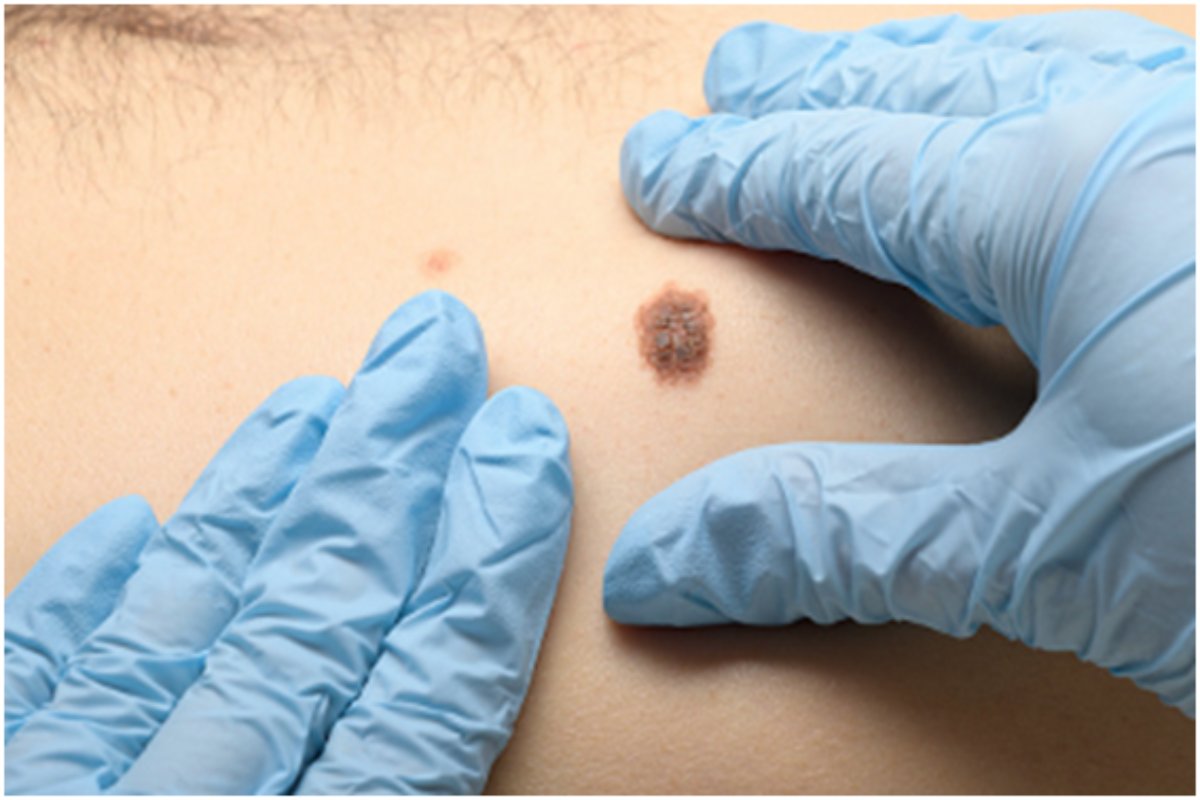In order to raise awareness around the condition of Malignant Melanoma, we spoke to The Dermatology Clinic London – specialists in mole removal and the diagnosis and treatment of skin conditions.
Melanoma, also called malignant melanoma, is a type of skin cancer that develops in skin cells called melanocytes. These are the cells that produce a pigment called melanin, giving the skin its colouring. For this reason, malignant melanomas are usually brown or black.
It’s important to note that not all moles are cancerous. Melanocytes can naturally grow together to form benign areas of pigment that we know as freckles and moles. However, when these cells begin to grow uncontrollably, it leads to malignant melanoma.
Melanomas are much more serious than other forms of skin cancer. They originate in skin cells, but are likely to spread to other areas of the body if it’s not detected early on in its development. It can take as little as six weeks for a melanoma to begin metastasising to other parts of the body, at which point it may become life-threatening. This is why early detection is incredibly important.
If the melanoma is found in its early stages and is localised, the five-year survival rate is 99%. When the cancer has spread to nearby cells, the survival rate decreases to around 66%, and if it spreads to distal areas of the body, the survival rate falls to around 27%. Unfortunately, around 2,300 individuals die from melanoma each year in the UK. This is why it is so important to contact your GP or Dermatologist for a check up – always be safe and sure.
Table of Contents
Who is Affected by Malignant Melanoma?
Melanomas did not used to be as common as other forms of skin cancer. However, the cases of malignant melanoma are rapidly increasing in the UK, and it is now the 5th most common cancer.
Over a quarter of skin cancer diagnoses are in those under the age of 50, with more women being affected than men.
Symptoms and Diagnosis of Melanomas
The most common symptom of melanoma is the change in an existing mole or the appearance of a new mole somewhere on the skin. Often, this involves the mole turning darker, growing into an irregular shape, or becoming asymmetrical. Malignant moles may also start to bleed or become very itchy.
However, they do not always have to begin in a mole or freckle. Melanomas can develop anywhere on the skin, most commonly on the back in males and the legs in females. Sometimes, they can occur in the mucous membranes of the body, such as in the eyes, mouth, respiratory tract, gastrointestinal tract, and genitals. This is known as mucosal melanoma and it accounts for around 1% of all melanoma cases.
Symptoms of mucosal melanoma include bleeding, itching, or pain in the mucosal areas. If the cancer occurs in the head or neck, it may also lead to changes in sense of smell or discoloration to the area. If it occurs around the vagina, there may be some unusual discharge. For melanomas in the anus, it can cause changes in bowel movements.

Causes of Malignant Melanoma
The primary cause of malignant melanoma is exposure to ultraviolet (UV) radiation from the sun or tanning devices. Research has shown that those who begin to use tanning devices before age 30 are 75% more likely to develop melanoma.
When UV light (in particular UVB rays) are absorbed by the skin, it can damage the DNA in the skin cells. This can lead to the cells growing rapidly and uncontrollably.
Areas of the body that are more pigmented are more vulnerable to developing malignant melanoma. Therefore, those who have a lot of moles and freckles are at a higher risk.
Other factors can increase the chances of developing malignant melanoma including the following.
- Having pale skin and fair hair
- Having a close relative who suffers from melanoma
- Having a weakened immune system or taking immunosuppressive medications
- Living close to the equator where the levels of UV radiation are much higher
- Excessive exposure to UV rays either from the sun or from frequent use of tanning devices
There are genetic conditions, such as xeroderma pigmentosum, that also increase the risk of skin cancer.
Treatment of Malignant Melanoma
The main treatment for malignant melanoma is surgery. Mole removal surgery is this is generally successful if performed during the early stages of development. However, if the melanoma has reached an advanced stage, and has metastasised, surgery may be ineffective.
In these situations, alternative treatments, such as mediations, are used to slow the spread of the cancer, boost the immune system, and reduce symptoms as much as possible. Immunotherapy methods involve stimulating the person’s immune system to enhance the chances of their body identifying and destroying cancerous cells.
Preventing Development of Melanoma
Although melanomas are not completely preventable, there are precautions that can be taken to reduce the risks of developing them.
Minimize UV exposure by avoiding excessive use of sunbeds and staying in the shade during the middle of the day when in hot weather. This is particularly important for those who are prone to sunburns. Make sure to wear protective clothing such as long-sleeved shirts, long trousers or dresses, and a hat to keep the skin covered.
Wearing sun protection cream is incredibly effective in blocking harmful UVB and UVA rays. If possible, wear some form of protecting factor every day of the year. UV rays are absorbed by the skin even on cloudy days.

Make sure to examine the skin regularly, even in the areas that are not usually exposed to sunlight such as the armpits, groin area, buttocks, and the soles of your feet. Becoming familiar with any existing moles and freckles is key to identifying any changes that might occur.
For those who are worried about a mole, changes in one or a number of moles, or if there are unusual areas of pain or bleeding, be sure to seek consultation with your GP or a Dermatologist.

